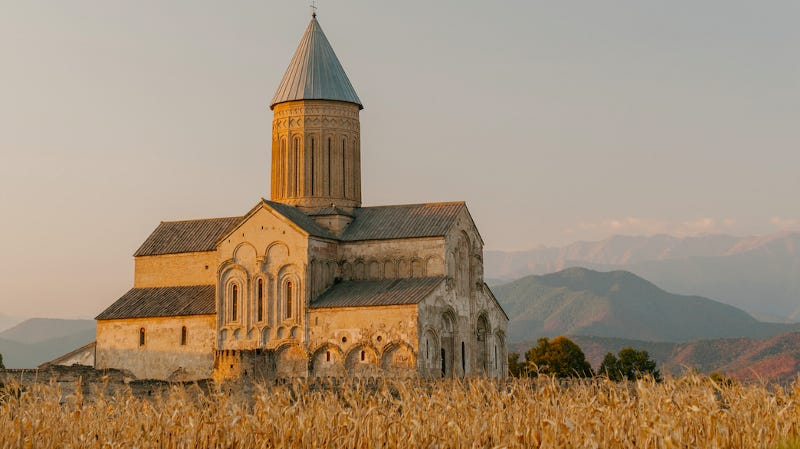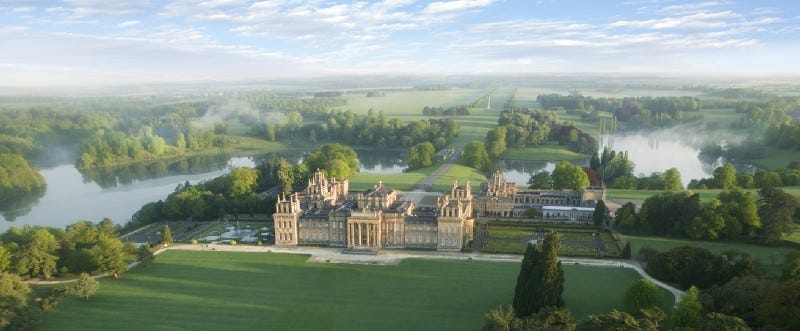
Welcome to Future Faith, a podcast, newsletter, and publication about living faithfully in an age of democratic destruction, ecological collapse, and economic irrelevance, available for free on Spotify, Apple Podcasts, and Substack:
Every morning I go on a walk past a river, beside a centuries-old working millpond, into a graveyard and apple-laden church ground, and through the ruins of a twelfth-century abbey.
If you walk around my village, you’ll see dozens of houses that are made of the exact same stones as the former abbey.
There’s a reason for this: When Henry VIII dissolved all the monasteries and started his own church in order to self-bless his murder of innocent women, locals in my village stole the monastery’s rocks.
The faded tourist sign says that the locals treated the monastery as a “convenient quarry.”
A convenient quarry.
That’s Christianity vs. Secularism in a nutshell, isn’t it?
Because it’s inherently consumerist, post-modernity loves to harvest what Christians first cultivated:
Hospitals
Universities
Human rights
Universal basic income
Secularism wants the kingdom without the king, the light without the power, the cathedral without the cornerstone.
Monasteries
What do you picture when you hear the word “monk?”
Old men in black robes?
Old women in white robes?
Why not a young bearded brewer who brews beer for the glory of God?
Why not a stay-at-home dad who adores children and wants to adopt a dozen orphans?
Why not a working mom who erects houses for the benefit of people who would never qualify for a mortgage?
What do you picture when you hear the word “monastery?”
A rotting stone building, utterly detached from the world?
Why not a vibrant house, street, neighborhood, village, or city?
When I hear the word “monastery,” I envision an estate.
When Henry VIII dissolved the monasteries, he sold their buildings and land to whichever local elite offered the most cash.
This allowed the British aristocracy to amass vast estates, with thousands of those plundered monasteries still owned by those same families to this day. (There are 144 estates over 10,000 acres in Scotland alone.)
Michelle and I have visited dozens of estates on various outings around the UK:
Chatsworth (1,822 acres, down from 200,000) invented the banana we all know and love.
Buccleuch (217,000 acres) raises 19,670 sheep, 700 cattle, 32,000 hens, and 117 red deer hinds.
Atholl (124,000 acres) hosts weddings and functions, has a trailer park, and does castle tours.
Highclere (5,000 acres) shot to fame as the shooting location for Downton Abbey.
When I picture a modern monastery, I picture a not-for-profit sustainable estate — studded with dozens of villages and hundreds of people — being run by kingdom principles for kingdom purposes.
The kingdom economy
The poor will always be among us because the rich will always be above us.
But not in the Acts 4 church, where there were “no needy people among them.”
And not in today’s monasteries, either.
For nearly 1,700 years, Christian monks and nuns have practiced Universal Basic Income.
In my travels, I’ve visited monasteries in Greece, Italy, Spain, England, Scotland, and elsewhere. I’ve been to many of the great foundations, including Monte Cassino, Assisi, Subiaco, etc. Monasteries are the last place in Christendom that still practice koinonia, the ancient and subversive Acts 2 practice that radically set apart the early church from the rest of society.
Koinonia is often translated as “community” or “fellowship,” but both are really terrible translations. “Brotherhood” and “communion” come closer, but the best description of koinonia might be “non-political spiritual communism.”
From each according to his ability, to each according to his need.
This isn’t forced or coerced secularist state-implemented communism. We know that doesn’t work.
This is a Holy Spirit-led sharing of life.
It is a communal life the world can never know or re-create.
In monasteries, koinonia looks like this: Everyone works a reasonable amount of time (typically 4–6 hours each day, 5–6 days each week) and contributes 100% of the proceeds to the monastery. The abbot and his team then ensure that everyone’s needs are provided for: food, clothing, shelter, medical, soul care.
No one is wealthy, but everyone is rich.
The impossibility of individuality
Just like biblical churches, monasteries aren’t democracies.
The abbot or abbess (from “abba,” meaning father) is in charge.
All the brothers or sisters put their faith in Christ and their trust in their abbot, and he is to lead them well — not as coercive politicians do, but as a true servant-hearted leader.
That’s why most rich Westerners — single or otherwise — will never enter a monastery.
It requires submission and surrender to a communal cause.
How will they know us?
I wish Christians were more like Jews and Muslims.
You can always spot a Jew in the crowd.
She’s the one with gorgeous hair and the husband with the yarmulke.
You can always spot a Muslim in the crowd.
They’re the ones not eating until sundown.
I’m not saying we should cover our women or face east at sunset. You know what I mean. Christians are barely discernible.
There’s only ever been one marker that really separates Christians from our neighbors — unconditional love, even for those who hate us.
But are we loving radically enough to make the world take notice in this attention culture?
Where are all the disturbing Christians?
Why don’t people leave our presence feeling deeply unsettled?
Being around Christians should feel conspiratorial, revolutionary, even dangerous.
After all, we serve a God who wants to change everything.
There is some biblical precedence for the concept of monasticism:
Elijah fled to the desert during a time of great persecution, and communed with God until the day he was called the restore the kingdom to their heavenly king.
Yahweh sent Moses and the Israelites into forty years of desert wanderings in order to shake off the mental shackles of slavery and prepare them for life as a free people.
John the Baptist counterintuitively moved to the desert to become an evangelist and prepare the way for his cousin Jesus.
If you study the life of Jesus, note how many times Christ removed himself “to a desolate place.”
Notice how all of these “monks” were incredibly connected to God and deeply invested in the renewal of the world? Notice how setting themselves apart actually allowed them to dive into culture and make a greater impact? It’s almost as though Christians are supposed to retreat in order to advance.
Let’s face it: Churches haven’t been churches in a long time. Worship bands and motivational preachers and fancy buildings take precedence over sharing our wealth, living a rule of life in community, and housing the poor.
It’s almost as if the monastery is a place of reformation and preparation for the next move of God in our lives and our culture.
First Egypt
When most people think about monasteries, they assume it’s just a retreat from “reality.”
And it definitely can be that.
But that wasn’t the original intention, not by a mile.
Inspired by Elijah and John the Baptist, monastics like Anthony the Great renounced the brutality, injustice, and oppression of the Egyptian mega-cities and moved to the desert to practice a Christ-centered life.
Pachomius developed the idea of monks living together, and in doing so, creating an alternate social structure to stand in sharp contrast to the rest of the world.
In an age before the Internet, social media, and viral videos, more than 50,000 people joined the Egyptian desert fathers and created what became known as Cities of God.
From there, the movement went viral, spreading all over the planet.
Monasteries aren’t retreats— they’re just new garden cities where the presence of God is actually welcomed.
Because monastics renounce individualism and work together as humans were meant to do, it means they inevitably become places of great art and culture, both attracting outsiders and sending people back out.
A nowhere always becomes a somewhere when Someone shows up.
Then Italy
A college student named Benedict of Nursia grew so horrified by city life in Rome that he moved to the ruins of Nero’s villa at Subiaco.
Living by the simple rule of “ora et labora” (pray and work), Benedict founded twelve communities in all, laid the groundwork for Western monasticism, and single-handedly saved Western civilization from extinction.
Benedict shapes every single day of our lives, and you can trace a direct line from Benedict’s communities to the faith transformation of hundreds of millions of people over the past 1,500 years.
A nowhere became a somewhere when Someone showed up.
Then Germany
In 1722, Nicolaus Ludwig Count von Zinzendorf bought a huge estate from his grandmother and invited several hundred Christian refugees to build a village on a corner of his estate.
The Herrnhut story is now world-famous, especially the 24/7 prayer meeting that lasted for more than a century and sparked America’s Great Awakening.
The community sent out hundreds of missionaries to all parts of the world, ministering to slaves in the West Indies and the Inuit in Greenland.
They founded a denomination that still has over 1,000 congregations.
They played a vital role in the salvation of John Wesley, whose ministry has impacted tens of millions of hearts.
One estate — one monastery — continues to impact lives nearly three centuries later.
A nowhere became a somewhere when Someone showed up.
Monasticism has problems
As usual, religion crept in, always ready and willing to replace real leaps of faith.
The monks in many monasteries I’ve visited get up far too early, hours before the sun, as though it’s somehow “godly” to ignore the natural rhythms by which God saw fit to govern our biological bodies.
Many monasteries fundamentally misunderstand prayer, spending four to six hours per day in the recitation of written chants instead of practicing a constant communion with Christ that leads to real action.
Many monasteries are self-protective and entirely self-focused, completely ignoring the Scriptural call to go out to the ends of the earth — that we are the hands and feet of Christ who must go to seek and save the lost.
Entrepreneurs for Jesus
We are living in an age of democratic destruction, ecological collapse, and economic irrelevance.
As the hyper-elites execute their Great Reset, the world is headed toward an unprecedented economic crisis. Within our lifetime, billionaires will control the global economy, the average house will cost $10 million, and surveillance currencies will dominate society.
This new economy is creating millions of families in need of affordable shelter, climate refugees in need of resettlement, and workers in need of sustenance when they are excluded from the corporate economy.
The church has a once-in-ten-generations opportunity to serve an unprecedented number of people in dire economic straights.
Throughout history, monasteries have fulfilled the biblical mandate to provide food, clothing, and shelter to people in need. To fund these works of generosity and hospitality, monks and nuns have practiced sanctified stewardship for millennia:
Vatopedi Monastery grows olive oil.
Himmerod Abbey had a museum, art shop, cafe, guesthouse, and fishery.
Saint-Sixtus Abbey brews the best beer in the world.
Caldey Abbey makes perfume.
Ampleforth Abbey presses cider.
Prinknash Abbey blends incense.
Little Portion Hermitage runs a bakery.
Cîteaux Abbey ages cheese and makes caramels.
Buckfast Abbey hosts conferences and raises honeybees.
Lindores Abbey invented scotch.
Depending on the skills and passions of the monks and nuns at each monastery, the community soon becomes self-sufficient — and because they live so simply, don’t have a profit motive, and share everything in common, they soon have a surplus to share with a world in need.
Questions to prayerfully consider
Where will God show up to meet real needs next?
Will we be the ones to welcome Him in?
My friend Andrew says that his job in life is to transfer as much earthly money into eternal value as possible.
It begs some questions:
If all your needs were met and you didn’t have to work a job to pay bills, what would you do for the kingdom?
How would you contribute to the kingdom if you didn’t have to waste a moment working to pay rent or a mortgage?
How would you invest your time in eternity if you didn’t have to enrich a land-lorder or a banker?
Most people miss their calling because they get mired down trying to pay bills.
God can and often does use us when we’re working those dead-end jobs, but let’s not pretend we weren’t all made for more.
You are unique in all of human history, with gifts and talents and strengths to contribute to the world that no money-hungry business could ever extract.
“Vocation” comes from the Latin for “voice.”
Does your work speak of who you are and whose you are?
You are worth more than your paycheck
We can survive without bankers and landlords, but we can’t live without farmers and mothers.
So why do the former get paid so much more than the latter?
Because we live in an upside-down society:
Insurance salesmen are incentivized to deny claims and let people die, while nurses suffer to keep people alive.
Fart app creators make millions while teachers have to buy their own chalk.
Bankers sit at a desk all day and type fake credit numbers into a screen, while active workers must pay them back by creating and handing over real wealth.
Sadly, most of the vocations that really matter, the ones that are incredibly humanizing, are almost entirely devalued by the monetary system:
Caring for widows/single moms
Feeding the hungry
Clothing the naked
Visiting prisoners
Being a mother or father, especially to orphans, foster kids, and at-risk teens
Sustainable organic farming, forestry, and soil production
True education (not propagandizing or teach-to-test)
Mentorship
But these callings matter — really matter — in the monastery system.
A vision for a modern monastery
Imagine an estate.
Hundreds or thousands of organic and sustainable acres under stewardship.
Dozens of villages.
Maybe even a garden city or two.
Hundreds of families, couples, and singles by choice and by circumstance.
With everyone answering a calling, practicing a real vocation, working as unto the Lord.
Not one land-lorder or banker to lay waste to anyone’s time.
With all profits to advancing the kingdom of heaven instead of the empire of man.
A group of people setting themselves apart in order to advance the Kingdom.
Like the monastic movements of the past, this one monastery could serve as a template for hundreds or thousands of others to follow — a platform for launching new and better works around the world.
It’s time for Christians to make monasteries great again.
A call to action
The church of Christ has been a convenient quarry for secularism for the past century, and as our society now grounds itself to dust, there is an opportunity to rebuild cities of God on firm foundations with the only cornerstone that cannot be shaken.
Please pray that God would send radically generous gospel patrons to fund the rebuilding efforts.
Some of these city-monasteries will be family condos in high-rise towers.
Some of these monasteries will be slums in hyper-cities.
Some of these monasteries will dorms in universities.
Some of these monasteries will be renovated abbeys and nunneries that have gone belly-up due to religion and a lack of vision.
In our case, we sense ours will be some sort of village-packed eco-estate.
Each of us needs to seek God’s face on the kind of set-apart monk or nun He is calling us to become.
We are the hands and feet of Jesus in this world. The harvest has and always will be plentiful, but the workers are few.
So let’s get to work.
Thanks for listening to Future Faith. We are 100% follower-supported, so please head over to jaredbrock.com to partner with us as a gospel patron.
If you think this episode is important and adds value to our global church family, please email the link to your friends or share it on social media.











